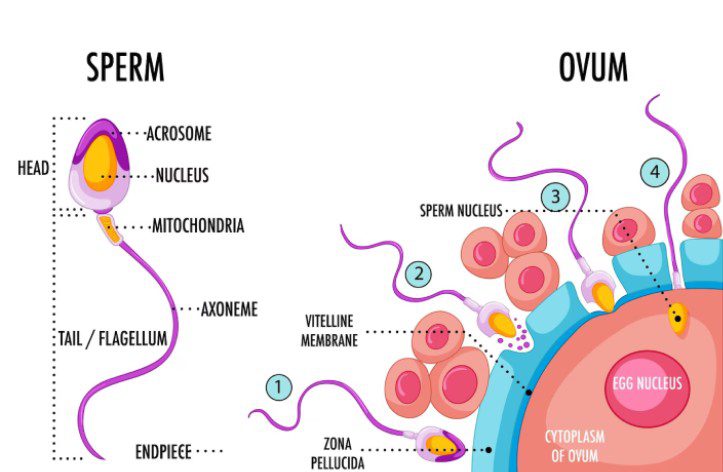Last Updated on July 5, 2023
How to Determine if He Ejaculated Inside You
When it comes to sexual encounters, understanding what happens during and after intercourse is essential for our overall well-being. One question often arises is whether or not ejaculation occurs inside the body. This article will delve into the topic and provide a comprehensive guide to recognizing the signs. It’s important to note that open communication, consent, and practicing safe sex should always be a priority in any sexual relationship.
Understanding the Male Ejaculation Process
A Brief Overview
To comprehend the signs of ejaculation, it’s helpful to understand the male reproductive anatomy and the stages of orgasm. During sexual arousal, the body undergoes various changes leading to the climax of orgasm, typically accompanied by ejaculation. Ejaculation refers to releasing of semen from the penis, containing sperm cells and seminal fluid. However, it’s essential to differentiate between pre-ejaculate (pre-cum) and ejaculate, as pre-ejaculate can also manage sperm and can potentially lead to pregnancy.
Communication and Consent
The Power of Communication
Open and honest communication is crucial in any sexual relationship. It’s essential to discuss sexual activities, boundaries, and expectations with your partner. By expressing your desires and concerns, you create a safe and comfortable environment to address sensitive topics, including ejaculation. Remember, consent should always be given and respected.
External Indicators
Physical Cues
Determining if ejaculation occurred can be inferred through external indicators. Observing changes in behavior and body language during and after intercourse may offer clues. For example, if your partner suddenly exhibits signs of relaxation or fatigue, it could indicate ejaculation. Additionally, visible signs such as semen on the penis or surrounding areas may suggest ejaculation. However, it’s important to note that relying solely on external indicators may not always provide definitive answers.
Internal Sensations and Reactions
What You Might Feel
Internal sensations can be an indication of ejaculation as well. Some individuals may experience a release of tension or a pulsating sensation in the genital area during orgasm and ejaculation. However, it’s crucial to recognize that these sensations can vary significantly from person to person. Sensations alone may not be a foolproof method for determining if ejaculation has occurred.
Utilizing Contraceptive Methods
The Role of Contraception
To prevent unwanted pregnancies and protect against sexually transmitted infections (STIs), it is crucial to utilize effective contraceptive methods. Reliable contraception can provide peace of mind regarding concerns about ejaculation. Options such as condoms, birth control pills, intrauterine devices (IUDs), or contraceptive injections are available. However, it’s important to remember that contraceptives primarily serve as preventative measures and do not definitively answer whether ejaculation has occurred.
Post-Sexual Activity Practices
Steps to Take
After sexual activity, there are certain practices you can adopt to address concerns about ejaculation. Taking a bathroom break and cleaning the genital area can help remove any remaining ejaculation. Additionally, in situations where there is a risk of pregnancy and contraception was not used or failed, emergency contraception can be considered. However, it’s crucial to consult a healthcare professional to discuss the appropriate course of action based on individual circumstances.
Addressing Concerns and Seeking Professional Help
You’re Not Alone
If you have concerns or questions regarding ejaculation and its implications, it’s important to remember that you are not alone. Many individuals have similar doubts and uncertainties. If you are unsure or anxious, seeking professional help and guidance is always wise.
Discussing your concerns with a healthcare professional, such as a gynecologist or a sexual health specialist, can provide accurate information, guidance, and peace of mind. These experts can address your situation, offer personalized advice, and provide medical knowledge to help you make informed decisions.
Additionally, there are various resources available for individuals seeking assistance and support. Sexual health clinics, hotlines, online forums, and community organizations dedicated to sexual education and awareness can provide reliable information and connect you with professionals who can address your concerns.
Remember, sexual health is an important aspect of overall well-being, and it’s essential to prioritize open communication, consent, and practicing safe sex. We can navigate these intimate matters with confidence and mutual respect by fostering a culture of trust and understanding in our relationships.
Conclusion
Understanding whether ejaculation occurred during intercourse can be a source of uncertainty and concern for many individuals. By familiarizing ourselves with the male ejaculation process, communicating openly with our partners, and utilizing effective contraceptive methods, we can better navigate these questions. While external indicators and internal sensations may offer some insight, it’s important to remember that they are not foolproof methods. Seeking professional advice and support can provide the necessary guidance and peace of mind. Ultimately, by prioritizing open communication, consent, and safe sexual practices, we can foster healthy and fulfilling relationships while addressing any concerns that arise along the way.
Common Misconceptions about Ejaculation
Ejaculation is a natural and normal part of the sexual experience for many individuals. However, there are several common misconceptions surrounding ejaculation that can lead to confusion or misinformation. Let’s address some of these misconceptions and provide accurate information:
Myth: Ejaculation always results in pregnancy.
Reality: While ejaculation can potentially lead to pregnancy if sperm enters the vagina, it’s important to note that pregnancy is not guaranteed with every instance of ejaculation. Factors such as timing in the menstrual cycle and the use of contraception play significant roles in determining the likelihood of pregnancy.
Myth: Pre-ejaculate (pre-cum) does not contain sperm.
Reality: Pre-ejaculate, the fluid released before ejaculation, can contain sperm. Although the concentration of sperm is generally lower in pre-ejaculate compared to ejaculate, it is still possible for pregnancy to occur if there is sperm present in the pre-ejaculate and it enters the vagina.
Myth: Ejaculation is always accompanied by orgasm.
Reality: While ejaculation and orgasm are often experienced together, they are not always synonymous. Some individuals may experience one without the other. It’s essential to recognize that sexual experiences vary among individuals and may not always follow a strict pattern.
Myth: Ejaculation is the sole indicator of sexual pleasure or satisfaction.
Reality: Sexual pleasure and satisfaction are subjective experiences that vary from person to person. It’s important to understand that ejaculation is not the sole measure of sexual fulfillment, and intimacy, emotional connection, and overall sexual experience significantly determine satisfaction.
Emotional Intimacy and Communication
Sexual relationships thrive on emotional intimacy and effective communication. When it comes to discussing concerns about ejaculation, open and honest communication is vital. Here are some key points to consider:
Building emotional intimacy: Emotional intimacy is cultivated through trust, vulnerability, and understanding. Create a safe space within your relationship where you and your partner feel comfortable discussing sensitive topics, including concerns or questions about ejaculation.
Active listening and empathy: When discussing concerns, ensure that both partners actively listen to each other and show compassion. Validate each other’s feelings and experiences, fostering an environment of support and understanding.
Shared responsibility: Addressing concerns about ejaculation requires shared responsibility. Both partners should feel comfortable expressing their needs, desires, and boundaries. Together, you can establish mutual agreements and find solutions that work for both of you.
Seeking professional help: If concerns persist or become a source of distress, consider seeking professional help. A therapist or counselor specializing in sexual health can provide guidance, facilitate communication, and offer strategies to navigate concerns related to ejaculation and overall sexual well-being.
Sexually Transmitted Infections (STIs)
Discussing ejaculation in the context of sexual health involves acknowledging the importance of protecting oneself from sexually transmitted infections (STIs). Here are some points to consider:
Safe sex practices: Engaging in safe sex practices, such as using condoms and getting tested regularly for STIs, is crucial regardless of whether ejaculation occurs. Ejaculation is not the sole determinant of the risk of contracting or transmitting STIs.
STI prevention methods: Educate yourself and your partner about effective strategies for STI prevention, including using condoms consistently and correctly, getting vaccinated for STIs such as HPV, and practicing mutual monogamy or being in a mutually agreed-upon non-monogamous relationship with regular testing and communication.
Regular testing: It’s important for sexually active individuals to undergo regular STI testing, regardless of whether ejaculation occurs. Regular testing can help detect and treat infections early, reducing the risk of transmission and maintaining overall sexual health. Consult with a healthcare professional to determine the recommended testing frequency based on your sexual activity and individual circumstances.
Communication and disclosure: Open and honest communication about STI status with sexual partners is essential. Discussing STIs, testing, and potential risks can help establish trust and ensure informed decision-making regarding sexual activities.
Treatment and support: If you or your partner is diagnosed with an STI, seek appropriate medical treatment and support. Many STIs are treatable, and healthcare professionals can guide you through the necessary steps to treat and prevent further transmission.
Remember, prioritizing safe sex practices and regular STI testing is crucial for overall sexual health, regardless of whether ejaculation occurs. By staying informed, practicing safe sex, and maintaining open communication, you can reduce the risk of STIs and promote a healthy and fulfilling sexual life.
Personal Experiences and Stories
Personal experiences and stories can provide valuable insights and perspectives on concerns related to ejaculation. Hearing from others who have navigated similar questions or uncertainties can help normalize the range of experiences. Here are a few examples:
Sharing stories of couples: Feature anecdotes or narratives from teams who have openly discussed concerns about ejaculation and how they navigated those conversations. Highlight the importance of understanding and supporting each other through effective communication.
Perspectives from individuals: Share personal accounts of individuals who have grappled with concerns about ejaculation, whether related to pregnancy, sexual satisfaction, or emotional well-being. These stories can help readers feel less alone and offer different approaches to addressing and resolving their concerns.
Expert insights and testimonials: Include insights from healthcare professionals or sexual health experts who have encountered patients with concerns about ejaculation. Their professional expertise and guidance can provide valuable information and support for readers seeking advice.
By incorporating personal experiences and stories, readers can relate to real-life scenarios and find comfort in knowing others have faced similar concerns. These narratives can offer relatable insights, practical advice, and emotional support, ultimately helping readers feel more empowered in addressing their own concerns about ejaculation.
Self-Care and Sexual Well-Being
Addressing concerns about ejaculation also provides an opportunity to discuss the broader topic of self-care and sexual well-being. Here are some essential aspects to consider:
Self-exploration: Encourage individuals to explore their bodies and become familiar with their sexual preferences, desires, and boundaries. This self-discovery can enhance overall sexual well-being and empower individuals to communicate their needs effectively with their partners.
Body positivity: Promote body positivity and self-acceptance as integral to sexual well-being. Encourage individuals to embrace their bodies, regardless of societal standards or expectations, and to celebrate their unique features and qualities.
Sexual confidence: Discuss strategies for building sexual confidence, such as enhancing communication skills, setting boundaries, and prioritizing self-care. Feeling confident in one’s own sexuality can positively impact sexual experiences and contribute to overall well-being.
Relationship dynamics: Explore the role of healthy relationship dynamics in sexual well-being. Emphasize the importance of mutual respect, trust, and open communication between partners. Healthy relationships provide a supportive and nurturing environment for addressing concerns about ejaculation and other sexual matters.
Seeking support: Encourage individuals to seek consent if concerns about ejaculation or sexual well-being become overwhelming. This can include contacting healthcare professionals, therapists, or support groups specializing in sexual health and well-being.
By discussing self-care and sexual well-being, individuals can gain a holistic understanding of the factors contributing to a fulfilling and satisfying sexual life. Promoting self-exploration, body positivity, and open communication can empower individuals to address concerns about ejaculation and navigate their own sexual journey with confidence and self-assurance.
Frequently Asked Questions
How can I tell if my partner ejaculated inside me?
Can I rely solely on internal sensations to know if ejaculation occurred?
Do contraceptive methods guarantee that ejaculation does not occur?
What should I do if I am uncertain whether ejaculation occurred and I am worried about pregnancy?
What should I do if I have concerns or questions regarding ejaculation?
Is it possible to get pregnant if my partner ejaculates outside but near the vaginal area?
Can I rely solely on visible signs to determine if ejaculation occurred?
What are some alternative methods for contraception?
Is it necessary to see a healthcare professional if I have concerns about ejaculation?
Are any support groups or resources available for individuals with concerns about ejaculation?
About The Author

Scarlett Aguilar is an infuriatingly humble troublemaker. She's always up for a good time, and loves nothing more than reading evil books and playing typical video games. Scarlett also writes for fun, and finds everything about outer space fascinating. She's proud of her work, but would never brag about it - that's just not her style.




